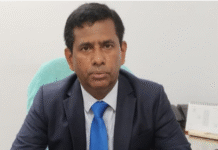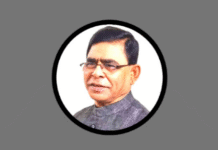Three investigations and 39 investigation officers have so far failed to unearth the mystery of the abduction of Kalpana Chakma and trace the Hill Women’s Federation leader even after 21 years of her abduction.
A police investigation, three-member judicial inquiry commission led by retired High Court judge Abdul Jalil and Criminal Investigation Department produced inconclusive observations about the whereabouts of Kalpana Chakma, abducted on June 12, 1986.
The Rangamati Chief Judicial Magistrate’s Court on June 8, 2017 deferred until July 18 the hearing in the abduction case.
The nearing was deferred as the prosecution failed to produce a videotape made by the judicial inquiry commission and news reports published in Bengali dailies Bhorer Kagoj and Sangbad on June 23 and 24 in 1996, said plaitiff’s lawyer Jewel Dewan of Bangladesh Legal Aid and Services Trust.
Jewel said that the prosecution had failed twice to produce video and news clippings before the court since March 22 when the court asked for these.
The plaintiff, Kalindi Kumar Chakma, also Kalpana’s brother, said that they were waiting for justice.
He had also filed a petition to the court on October 19, 2016 expressing no confidence in the latest probe report.
Rangamati district superintendent of police Tariqul Islam, also the investigation officer of the case, submitted the final report on September 7, 2016 closing investigation into the abduction, stating that there were not enough evidences for bringing the accused to justice.
Chance of Kalpana’s being rescued in future is ‘very thin,’ read the police report, placed before the court on September 15, 2016.
On June 12, 1986, Kalpana, the then organising secretary of Hill Women’s Federation, was abducted by Lieutenant Ferdous from her house at New Lalyaghona of Baghaichari in Rangamati several hours before the seventh national elections, said Kalindi, also a witness to the abduction.
Kalpana was then campaigning for independent candidate Bijoy Ketan Chakma, the then senior presidium member of Pahari Gana Parishad, who was supported by all hill peoples’ organisations active at that time.
Kalindi filed the case with Baghaichari police station a few hours after the abduction.
The investigation that continued for 20 years saw 39 officers investigating the case in phases.
After 14 years of investigation, Baghaichari police submitted a final report on May 21, 2010 and Rangamati chief judicial magistrate on September 2, 2010 ordered the Criminal Investigation Department for a further investigation sought by Kalindi as the investigation ‘failed’ to identify the abductors.
The same court on January 16, 2013 ordered the third investigation into the case as Kalindi prayed for on the ground that the CID investigation report also ‘failed’ to identify the kidnappers and that too without interrogating the accused.
A progress report, submitted by the then Rangamati superintendent of police Amena Begum on July 20, 2014, said that it was not possible to complete the investigation until Kalpana Chakma was rescued or a final decision on her status was made, as she was the main witness to the abduction.
Latest police report in September 2016 claimed that no enough evidences were found to put the three, named in the first information report, before justice.
The family had rejected the report of a judicial inquiry commission that had come up with similar findings.
The commission failed to identify any abductor but resolved that ‘she had been abducted willingly or unwillingly.’
Kalpana, a bachelor’s student at the Baghaichari Kachalang College, was known to be an outspoken political activist. Her political activities inspired many ethnic minority people, particularly women. Her abduction had outraged the nation.
Different organisations of hill people, including the Hill Women’s Federation, have taken elaborate programmes to mark the 21th anniversary of the disappearance of Kalpana Chakma.
Naripokkho, a non-governmental organisation working for women’s rights, in a release on Sunday, demanded the immediate steps to find out all who became victims to enforced disappearance, including Kalpana Chakma.
Source: New Age









